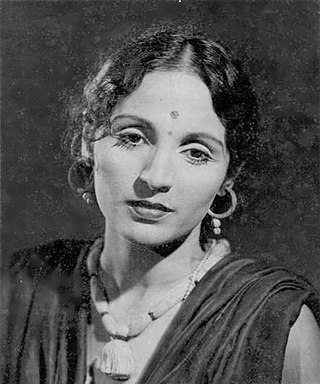
Shobhana Samarth was an Indian director, actress and producer, who began her career in the early days of talkie movies in the Hindi film industry and continued in lead roles into the 1950s.
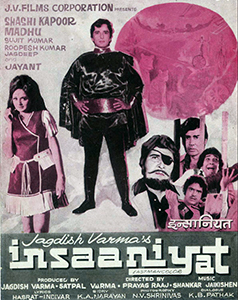
Insaaniyat is a 1974 Bollywood drama film directed by Prayag Raj. The film stars Shashi Kapoor, Madhu and Sujit Kumar in pivotal roles with Jayant, Jagdeep, Durga Khote, Krishan Dhawan, Roopesh Kumar and Kamal Kapoor in supporting roles.

Badle Ki Aag is a 1982 Hindi-language action thriller film, produced and directed by Rajkumar Kohli under the Shankar Movies banner. It stars Sunil Dutt, Dharmendra, Jeetendra, Reena Roy, Smita Patil and music was composed by Laxmikant–Pyarelal. Badle Ki Aag was a box-office success.
Gaon Ki Gori is a 1945 Indian Urdu and Hindi-language film. It was the second highest grossing Indian film of 1945. Directed by K. Amarnath, the cast included Noor Jehan, Durga Khote, Nazir, Jagdish Sethi, Mishra, Shanta Patel, Ibrahim, Nawaz, Chandrika, Ghosh, Rama Shukul, Anant Marathe, Rajkumari Shukla, Bikram Kapoor, Geeta Nizami, Rajkumari Kapoor, Ghulam Rasool and M.A. Khan.
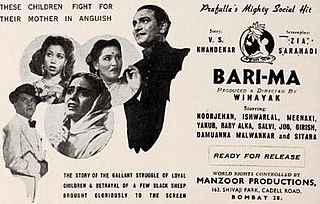
Badi Maa , also called Bari-Ma, is a 1945 Indian Hindi-language war drama film. It was produced and directed by Master Vinayak. Made under the banner of Prafulla Pictures, Kolhapur, it had story written by V. S. Khendekar. Zia Sarhadi wrote the screenplay and lyrics for six songs. The other lyricists were Anjum Pilibhiti and Raja Badhe. The music director was K. Datta.
Anuradha is a 1940 Bollywood film directed by Mohan Sinha. It stars Trilok Kapoor, Jeevan, Maya Bannerji, Vatsala Kumtekar, Anant Marathe and Agha. The film was produced by Circo Productions and had Badri Prasad as its music director.
Chingari (transl. Embers) is a 1940 social Hindi film directed by Sarvottam Badami. Made under the banner of Sudama Productions, the film had music by Gyan Dutt. Prithviraj Kapoor shifted from New Theatres Ltd. Calcutta to Bombay, where he worked under Badami in two films, Sajani and Chingari both made in 1940. The cast included Prithviraj Kapoor, Sabita Devi, E. Billimoria, Meera, Khatoon and Keshavrao Date.
The Secretary is a 1938 Hindi-language Indian comedy film directed by Chaturbhuj Doshi. The film was produced by Chandulal Shah under the Ranjit Pictures banner. The music was provided by Gyan Dutt with lyrics by Pyare Lal Santoshi. The main cast was Noor Mohammed Charlie, Trilok Kapoor, Madhuri, Kalyani Das, Waheedan Bai and Rajkumari.
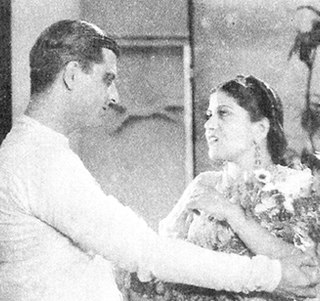
Bharosa (Trust) is a 1940 Hindi/Urdu social melodrama film produced and directed by Sohrab Modi. Made under the Minerva Movietone banner, the story and lyrics were by Lalchand Bismil, with cinematography by Y. D. Sarpotdar. The music was composed by G. P. Kapoor, and the cast included Chandra Mohan, Sardar Akhtar, Mazhar Khan, Sheela, Maya Devi and Eruch Tarapore.
Rambaan is a 1948 Indian Hindi-language mythological drama film directed and produced by Vijay Bhatt and written by Mohanlal Dave, with dialogue by Pandit Girish. The film starred Prem Adib as Rama and Shobhana Samarth as Sita, with Chandra Mohan, Umakant, Amirbai Karnataki and Raj Adib in other principal characters. The film's music was composed by Shankar Rao Vyas.

Ramayan is a 1954 Hindi religious film based on Valmiki's Ramayana, produced and directed by Vijay Bhatt for Prakash Pictures. The music directors were Shankar Rao Vyas and Hariprasanna Das and the lyrics were written by Ramesh Gupta, Pandit Indra, Neelkanth Tiwari, Baalam Pardesi. The film starred Prem Adib and Shobhana Samarth once again as Rama and Sita. The two actors had earlier acted in a trilogy of Bhatt's films based on the Ramayana, Bharat Milap (1942), Ram Rajya (1943) and Rambaan (1946). All three had been extremely successful, with the audience accepting them in the traditional roles. The other costars included Shahu Modak, Durga Khote, and Umakant.

Veer Kunal also called Son Of Ashoka is a 1945 Hindi historical fiction film directed by Kishore Sahu. Besides directing the film Sahu also produced it and wrote the story and screenplay. The cinematographer was Chandu. Produced under the Ramnik Productions banner, it had music by Khan Mastana. The starcast consisted of Kishore Sahu, Shobhna Samarth, Durga Khote, Mubarak and Maya Banerji.

Thokar also called The Kick is 1939 Hindi/Urdu film directed by A. R. Kardar. Produced by Chandulal Shah for his production banner Ranjit Movietone, it had music by Gyan Dutt. The story writer was M. Sadiq, with cinematography by Gordhanbhi Patel. The cast included Kumar, Ishwarlal, Madhuri, Yakub, Noor Mohammed Charlie, Ram Marathe, Waheedan Bai and Dixit.
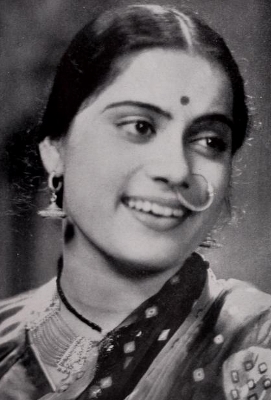
Shanta Apte (1916–1964) was an Indian actress-singer who worked in Marathi and Hindi cinema. Renowned for her roles in films like Duniya Na Mane/Kunku (1937) and Amar Jyoti (1936) under the Prabhat Films banner, she was active in Indian cinema from 1932 to 1958. Apte's impact on Marathi cinema "paralleled" that of Kanan Devi in Bengali cinema. Along with Kanan Devi, Apte is cited as one of the "great singing stars" from before the playback singing era. Apte began her career in films playing the role of a young Radha in the Marathi film Shyamsunder (1932). She joined Prabhat Films acting in her first Hindi language film Amrit Manthan in (1934).

Trilok Kapoor was an Indian actor and a member of the Kapoor family who worked in Bollywood films. He was the younger brother of actor Prithviraj Kapoor.
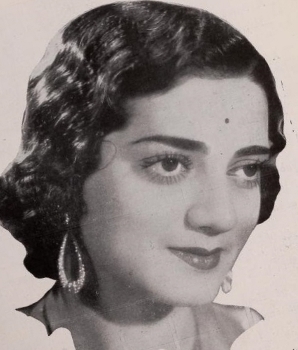
Sabita Devi (1914–1965) was a Hindi film actress in Indian cinema. She is stated to be one of the "prominent" leading ladies of the "pioneering era" of Indian cinema along with Mehtab, Bibbo, Durga Khote, Gohar, Devika Rani and Seeta Devi. A Jewish by birth, she changed her name to find acceptability in Hindi cinema like the other Anglo-Indian and Jewish actresses of her time, Sulochana, Seeta Devi, Madhuri, and Manorama. After initially working with British Dominion Films Ltd., Calcutta, she shifted to Bombay and performed mainly in films produced by Sagar Movietone with her co-star in most films being Motilal. Some of the popular films with Motilal were Dr. Madhurika (1935) and Kulvadhu (1937) directed by Sarvottam Badami. Their first film together was Shaher Ka Jadoo (1934), which was also Motilal's debut film, and then Lagna Bandhan (1936) both directed by Kaliprasad Ghosh. She acted in Silver King (1935) with Motilal. It was an action film directed by C. M. Luhar, which became a "huge success".
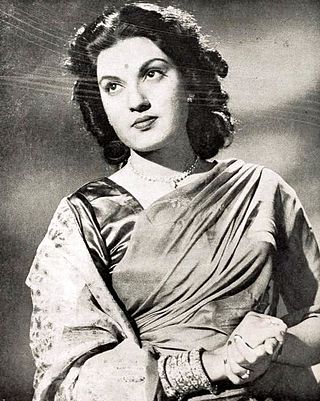
Munawar Sultana was an Indian cinema actress, who acted in Hindi films. She is cited as one of the "popular" actresses of the late 1940s to early 1950s period, along with Noor Jehan, Swarnalata and Ragini. Her specialty was playing a selfless woman, enduring the rough treatment meted by her husband and family, but who eventually "brought her erring husband back home".

Mazhar Khan was an actor, producer, and director in Indian Cinema. He started his career as a police officer, which he left to study law for a short period. After abandoning his studies, he came to Bombay and started his career in cinema with the silent film Fatal Garland (1928) opposite the top actress of the time, Ermeline. He became a popular actor, gaining success in several silent films. During his stint in silent films he worked with well-established directors such as Bhagwati Prasad Mishra, Ezra Mir, Moti P. Bhagnani, R. S. Chowdhary, and M. D. Bhavnani. Magazines in the 1940s compared Khan to Hollywood actors such as Paul Muni, Bela Lugosi and Boris Karloff.













